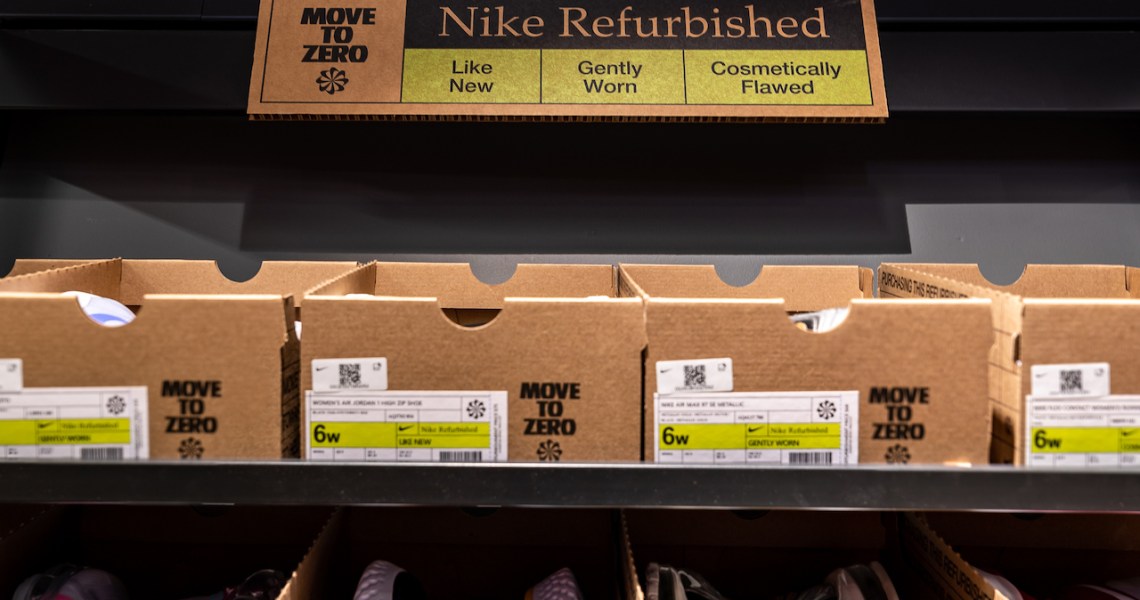In the last three years, fashion resale has become an increasingly important sector of the industry. Many fashion brands once skeptical of the concept have gradually come to embrace resale, either partnering with resellers or debuting resale of their own.
But even with the gulf between the two sectors shrinking, the potential for conflict still exists. Nike’s lawsuit against StockX, which was announced publicly on February 4, reveals where this conflict still burns the hottest. Resellers, by their nature as the secondary market, are fully dependent on brands for their lifeline. StockX does not exist without a steady supply of new, hyped Nike sneakers that customers clamor to get their hands on and turn to StockX to find.
But when resellers claim too much ownership of a brand’s image and narrative, that’s when they step over a line.
The crux of Nike’s grievance is that when StockX began selling NFTs that used Nike sneaker imagery, it went beyond just reselling existing Nike products and crossed into creating new products, completely outside of Nike’s purview, that used Nike imagery and trademarks.
Nike’s own wording shows the sportswear giant’s feeling that this is crossing a line in the brand-reseller relationship.
“[StockX’s] statements reflect the fact that StockX’s Nike-branded Vault NFTs, whose purchasers can trade or collect and display in their portfolio, are new virtual products that StockX has bundled with additional StockX services and unspecified benefits (‘exclusive access to StockX releases, promotions, events,’)” Nike’s lawsuit reads. “Nike does not sell StockX’s services or exclusive access to such benefits. Yet StockX’s new virtual products have been created, marketed, offered for sale, and sold by StockX using Nike’s trademarks without Nike’s consent. And, according to StockX, it is ‘just getting started.’”
It doesn’t help that Nike is interested in making its own NFTs, and has begun hiring aggressively to do so. StockX’s use of Nike imagery in its NFTs represents not just alleged trademark infringement, but also potential competition to Nike’s own NFT ambitions.
The conflict is similar, in principle, to the most notorious brand-reseller conflict: the years-long lawsuit between Chanel and The RealReal. Chanel has similarly charged The RealReal with crossing a line between the two entities. In Chanel’s view, when The RealReal claimed to be able to authenticate Chanel bags with 100% certainty, it made a claim on something that Chanel believes it has the sole right to do: authenticate its own products.
That conflict lasted more than two years and was finally suspended in April of 2021 with an undisclosed out-of-court settlement.
Designer Jeff Staple, although an admitted fan of fashion resale, has voiced his own concern over how resellers use brand imagery in marketing materials. After American Eagle first dipped its toes into resale in 2019, Staple told Glossy that he was uncomfortable with how freely resellers use brand trademarks, logos and imagery in their own advertising. On the one hand, resellers have the right to resell goods and the right to advertise what they sell, but on the other hand, it can create the false impression that the brands approved or were involved with some element of the resale of their goods, which they frequently are not.
“Over the long term, brands and resale marketplaces have different incentives,” said Andy Ruben, CEO of branded recommerce company Trove. “Third-party marketplaces look to develop their own customer base. Brands want to own their brand image. Ultimately, those incentives pull them in different directions, even if they have a marriage of convenience.”
Instead of working with third-party resellers, brands are becoming increasingly interested in owning their own resale channels. They’re turning to companies like Trove, ThredUp and Archive to help them build the channels where they have complete control over how their products are resold.
But resale marketplaces like StockX and The RealReal are too big to ignore. As much as brands would like all reselling of their products to go through their own channels, customers just want to find the product they want at the best prices. Both StockX and The RealReal do hundreds of millions in revenue each year. While brands may have to live with the reality that these platforms are huge purveyors of their products and may not sell those goods exactly the way the brands want, there are some things that remain intolerable.
“And this will only get more complicated with the rise of NFTs,” Ruben said. “Adding the digital component to the mix, and the questions of who owns a brand identity in the digital sense and the physical sense, it’s all very early days for this idea.”




